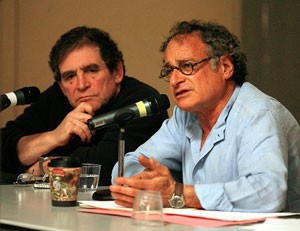One of the most traveled human beings in the world and one that imagines the world without them sat side by side as they fed off their mutual experience as international journalists and discussed the future role of journalism as it pertains to global issues about the environment and the perception of U.S. policies abroad.
Mort Rosenblum and Alan Weisman, award-winning journalists, authors and professors of international journalism at the UA, spoke to a crowd of about 60 in the Santa Rita Room of the Student Union Memorial Center yesterday.
Jacqueline Sharkey, head of the journalism department, introduced the lecturers and said the idea to hold a public forum on issues of global importance relates to the role of journalism in a democratic society to provide information free from government interference.
Rosenblum, a UA alumnus based in France, and an eight-time Pulitzer Prize nominee, tied in his latest book “”Escaping Plato’s Cave: How America’s Blindness to the Rest of the World Threatens our Survival,”” to the pressing need for journalists to understand and immerse themselves in the area they write about.
“”Drastic things are going on in the world and we’re not watching; if we’re there, you’re there,”” he said. “”I always shudder at the term citizen journalist because I don’t want a citizen orthopedic surgeon operating on my foot, but really the American public is invested in what our government does abroad, and our job is to represent the public and inform them of what our government is doing.””
Weisman added some political context to Rosenblum’s definition explaining that the current war in Iraq would have never happened, had there been more trained journalists exposing what was actually happening before the U.S. went to war.
Weisman’s critically acclaimed book “”The World Without Us,”” imagines the world without humans to show how the environment would respond without human pressure.
“”Had we had more journalists in place, like we did in the 1960s with Vietnam, we could have exposed Colin Powell’s lies so massively, that there would have been no justification whatsoever for our involvement in Iraq,”” Weisman said.
Rosenblum said the Iraq War is just one example of the negative image the U.S. has in other countries. Rwanda, Darfur and Bosnia are other examples, he said.
“”The fact that we don’t have a number amount for the dead in Iraq is telling of how journalism needs to change,”” Rosenblum said. “”By allowing facts to go unreported and letting conflicts go on for so long, we’ve created scars that won’t heal in my lifetime.””
“”We think we can just shut the TV off and turn-off our problems, but these days the TV set keeps going all the time,”” Rosenblum said.
The problem is not that we don’t know about issues like famine or global warming or war, but that we don’t do anything about them until it’s too late, he said.
“”The world knows more about us than we know about them,”” Rosenblum said, adding that it contributes to the negative image of the U.S. around the world.
“”Why do they hate us? Part of the problem is that we lump six billion people into a four- letter word: They,”” he said.
Another reason is our government’s stance on environmental issues, Weisman said.
The international community is outraged, absolutely outraged that our government did not ratify the Kyoto Protocol, an international diplomatic effort to reduce Greenhouse gases that cause climate change.
The journalists also discussed how limited amounts of water and oil are leading to wars about resources.
“”There was the Gold rush, a rush on Macy’s during a sale, now we are very much in a resource rush,”” Weisman said. “”It’s created this backlash of people going ‘Let’s go get resources while the getting is still good.'””
The world needs more journalist correspondents in the field to make sense of those issues and alert the public of serious problems, Rosenblum said.
The challenge in doing that has a lot to do with the corporatization of the journalism industry Weisman said, adding that the pressure on news organizations to produce profit prevents them from fulfilling their duty as a government watchdog, as does the Internet and the monopoly of companies like Microsoft, Corp., Yahoo and Google over news content.
“”I was at Microsoft two days ago talking about my book and I told them that they are princes in an electronic feudal system. They don’t really care what’s on their Web sites, as long as people are coming, and that’s harmful to journalism and that’s harmful to the public,”” Weisman said.









